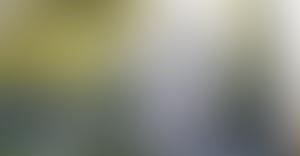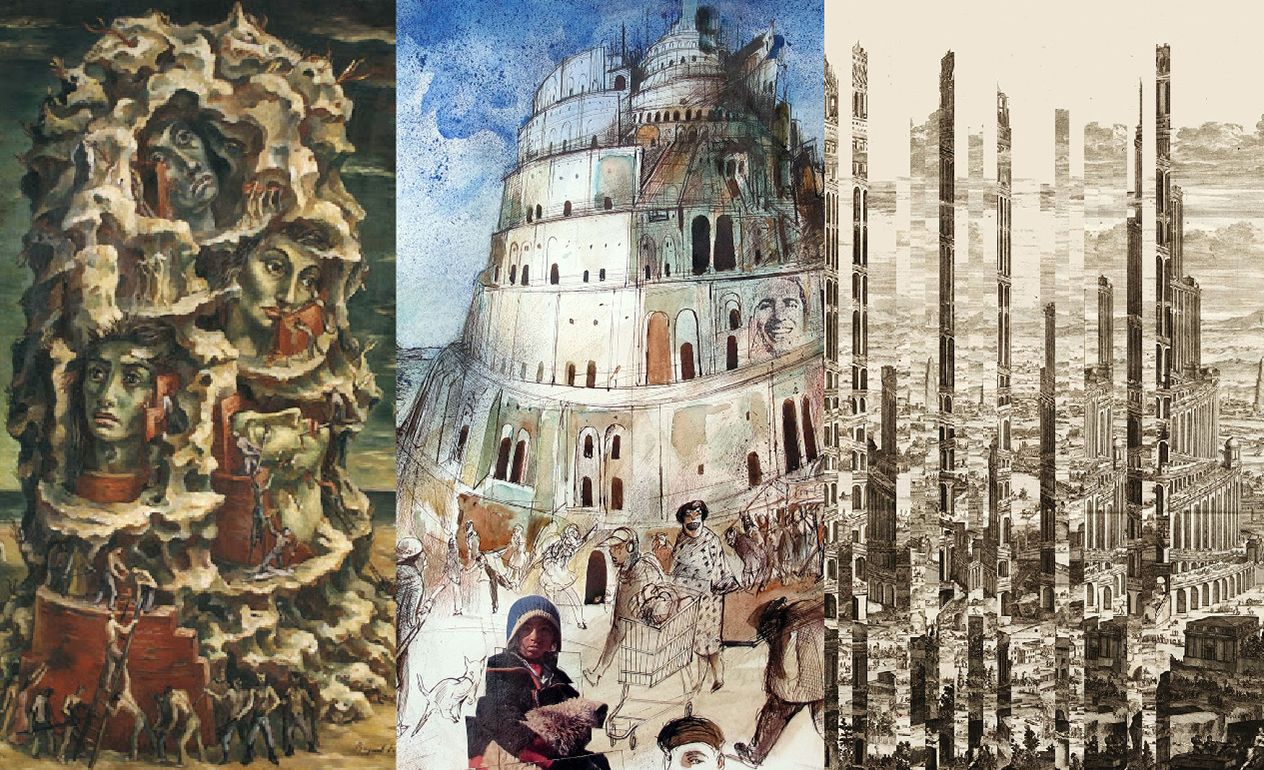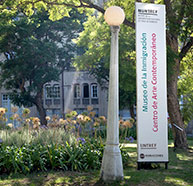-
After Babel


-
After Babel


-
Message of the Rector
Three years ago, multiple meetings with Barbara Cassin allowed us to envision the possibility of a Rio de la Plata version of After Babel.
The pandemic did not prevent us from continuing to work to make it happen. This is how—through the creative impulse of our artistic director Diana Wechsler and the research and careful work of curators Marina Aguerre and Leandro Martínez Depietri—we now arrive at this exhibition for which it is difficult to find the adjectives that can describe its quality, beauty, and adjusted political dimension. It all can however be synthesized in the epigraph that describes the work and that welcomes us upon entering the Hotel de Inmigrantes, headquarters of our MUNTREF Contemporary Art Center: “Equality has no frontiers.”
Aníbal Y. Jozami
MUNTREF General Director
-
Curatorial Text
After Babel. Translations from the Rio de la Plata
There is no translation without difference between languages, without misunderstandings. This misunderstanding has been called “Babel.” Babel… curse or opportunity? It is not a matter of directly answering this question but rather of exploring the alternative, allowing ourselves to be guided by the force of translation.
Translation is a very broad concept. Its meaning, historically constructed, did not always have the same practices and has not ceased to nourish metaphor. In fact, it is one of the great challenges for our globalized world.
Translating is preferring a difficult and sometimes perplexing work on the difference between languages, cultures, and worldviews, rather than a quick and basic communication in a more or less artificial dominant language (currently called “Global English” or “Globish”) in order to compare and harmonize them.
The relationship between continents, in particular between America and Europe, was built on this paradoxical practice: saying “almost” the same thing and making up, in that passage, something new which emerges from the confluence of knowledge and languages.
What is the singularity of Argentina, and even of Buenos Aires, in terms of encounters between languages? What if we were to make of translation, an experience of articulation with differences, not an obstacle but the matrix of a twentieth-century literature and citizenship?
Curatorship and research: Barbara Cassin (Académie Française/CNRS), Marina Aguerre, Leandro Martínez Depietri
MUNTREF Production: Violeta Böhmer, Camila Carella
Acknowledgements: Julieta Colombo, Santiago Durante, Leontina Etchelecu, AGN team, Mariano Moreno National Library team, Centro Materia team (UNTREF), Maximiliano Estravis, Natalia Garnero, Silvina González, Nicolás and Marion Helft, Marcelo Huernos, René Krüger, Alicia Esperanza Lamas, Ernesto Montequin, Lía Munilla Lacasa, Liliana Piñeiro, Agustina Rodríguez Romero, Gabriela Siracusano, Gustavo Tudisco, Ana Viladrich, Mariela Yeregui.
With the sponsorship of: Torcuato Di Tella Institute Archive; Quino Archive; Mariano Moreno National Library; Bibliothèque Nationale de France; CeDInCI – Center for Documentation and Research on Left-wing Culture; Vigo Experimental Art Center; Enrique Udaondo Provincial Museum Complex; Augusto y León Ferrari Art and Tradition Foundation; Espigas Foundation; Forner-Bigatti Foundation; Fortabat Foundation; SUR Foundation; Chantal Crousel Gallery; Herlitzka + Faría Gallery; Jorge Mara-La Ruche Gallery; Kamel Mennour Gallery; Institut National de l’Audiovisuel de France; Mirtha Dermisache Legacy; Ministry of Foreign Affairs, International Trade, and Worship; MuCEM-Musée des civilisations de l’Europe et de la Méditerranée; Casa de Rogelio Yrurtia Museum; Isaac Fernández Blanco Museum of Hispanic-American Art; Museum of Latin American Art of Buenos Aires (MALBA); Cornelio Saavedra Historical Museum of Buenos Aires; National Historical Museum; Mitre Museum; National Museum of Fine Arts; Xul Solar Museum – Pan Klub Foundation; UNESCO-Villa Ocampo Observatory; Palais de Glace; Ruth Benzacar Art Gallery.

The project is produced by IIAC-UNTREF and co-produced by the Institut français d’Argentine, Ambassade de France en Argentine, Alliance Française Buenos Aires, and Organisation Internationale de la Francophonie, together with the support of Translitterae.
List of Artists:
Roberto Aizenberg, Nurith Aviv, Giovanni Battista Piranesi, Antonio Berni, Pierre Bismuth, Ángel María Camponeschi, Ariel Cusnir, Mirtha Dermisache, Gustave Doré, León Ferrari, Raquel Forner, Lihuel González, Annemarie Heinrich, Fabio Kacero, Leandro Katz, Pablo Lehmann, Mark Liberman, Edgardo Madanes, Nicolás Martella, Léonie Matthis, Marta Minujín, Raymond Monvoisin, Carlos Morel, Johan Moritz Rugendas, Marie Orensanz, Margarita Paksa, Jean Léon Pallière, Carlos Pellegrini, Cristina Piffer, Lidy Prati, Proyecto 31 colores, Quino, Auguste Rodin, Jesús Román, Juan Carlos Romero, Anri Sala, Luis Scafatti, Eduardo Schiaffino, Zineb Sedira, Giacomo Simoncelli, Xul Solar, Grete Stern, Sebastián Tedesco, Gabriel Valansi, Hugo Vidal, Edgardo Vigo, Wifredo Viladrich, Yang Yongliang, Rogelio Yrurtia.
Documents, texts, and translations by: Domingo F. Sarmiento, Edgar Allan Poe, Eduarda Mansilla, Eduardo Wilde, Enrique Pichón Riviére, Ezra Pound, Freud, Homero, Jacques Lacan, James Joyce, Jorge Glusberg, Jorge Hess, Jorge Luis Borges, José Hernández, Juan Domingo Perón, Juan Eugenio Labougle, Juan Manuel de Rosas, Juan Nieremberg, Judith Gociol, Leopoldo Lugones, Manuel Belgrano, Manuel Ricardo Trelles, Mariano Moreno, Martín Caparrós y Jorge Dorio, Marx, Oswald de Andrade, Ricardo Rojas, Samuel Glusberg, Santiago Rueda, Sixto Palavecino, Victoria Ocampo, Walt Whitman, among others.
Venue
Center of Contemporary Art







